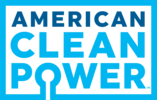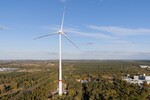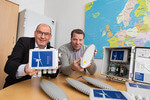News Release from American Clean Power Association (ACP)
Wind Industry Profile of
11/03/2010
USA - American Wind Energy Association Statement on the 2010 mid-term elections
U.S. wind power remains as popular as ever with the American voter. Every time a referendum has been held on renewable energy, voters have resoundingly said they want more, not less.
That was the case in California last night, as it was in Colorado, Missouri, and Washington before—wherever state Renewable Portfolio Standards have come up for votes.
Voters strongly support renewable energy because they want the new jobs and manufacturing base it means for Americans, and they want all the benefits of making our own clean energy here in the U.S.A.
Proposition 23 would have undone California’s Renewable Portfolio Standard (also known as a Renewable Electricity Standard) and sent us backwards. Yesterday’s vote was a victory over all the fossil fuel lobbyists who seek to block competition from clean renewable energy. A recent Harris poll found 87 percent of Americans want more wind energy.
Now we’ve got a job to do. Last year, wind farm accounted for 39 percent of new installed electric capacity, versus 13 percent from coal; in the first nine months of 2010, however, that ratio flipped, and wind turbines accounted for only 14 percent, versus 39 percent from coal. That is not what Americans want, it’s not what they deserve, and we’ll keep working every day to change that.
On the new Speaker of the House and other election results
The U.S. wind energy industry looks forward to working with John Boehner, the next Speaker of the House. Like us, he wants to “reduce our dependence on foreign sources of energy, protect us against blackmail by foreign dictators, create American jobs and grow our economy,” as Rep. Boehner says on his website. He says he wants to roll up his sleeves and get to work creating jobs.
The market-based policies that drive renewable energy—tax credits and resource portfolio standards—are perfectly compatible with Rep. Boehner’s agenda, and have been supported on a bipartisan basis at the state and federal level for over a decade.
Members of Congress on both sides of the aisle have supported the U.S. wind energy sector, too, for many years because they know it creates jobs for Americans and investment in our economy, as well as homegrown clean energy made in the U.S.A.
We only have to go back as far as 2005, when the Energy Policy Act was passed, to see that policies helpful for our industry can be passed under Republican control. And, former Senate Majority Leader Bob Dole of Kansas just told reporters that of all the issues that may move in the new Congress, energy is most likely to find bipartisan agreement.
In the Senate, Majority Leader Harry Reid’s victory in Nevada was significant for the clean energy and transmission agenda, given his active involvement in those important issues. Additionally, we look forward to working with a number of newly elected members who are wind supporters in the incoming class.
Supporters of offshore wind energy fared well in Rhode Island, Massachusetts, and Maine.
Victorious gubernatorial candidates Deval Patrick (MA), Rick Perry (TX), Peter Shumlin (VT), Jerry Brown (CA), and John Hickenlooper (CO) are among the renewable energy supporters who won on Tuesday.
By extending short-term tax credits in 2009, Congress helped boost the U.S. wind industry to historic job growth and a high of 10,000 MW in new capacity last year. Now the U.S. wind industry has slowed to less than half that rate, while China is installing three times the wind power we’re installing. Congress needs to put America’s wind industry back on track.
Swift passage of a Renewable Electricity Standard and preserving the 1603 tax credit program ought to be high on the agenda in the remaining lame duck session of this Congress.
The new Congress will need to signal to the world that our country is open for business, and ensure that we get more of our energy here, and import less from overseas.
Wind can add clean, new electric generation faster than any other source of electricity, at a cost that’s competitive, and keep 85,000 Americans working. We think everyone can agree on that, no matter what side of the aisle you’re on.
2010 Election Analysis & the Wind Industry Webcast
Please join Denise Bode and senior staff members for a video webinar on Friday, November 5 on how the election results will affect wind energy, what we did to counter misinformation during the campaign, and lessons of the industry's third quarter results. More information can be found here: www.awea.org/electionanalysis/.
For more information on this article or if you would like to know more about what www.windfair.net can offer, please do not hesitate to contact Trevor Sievert at ts@windfair.net
www.windfair.net is the largest international B2B Internet platform – ultimately designed for connecting wind energy enthusiasts and companies across the globe!
That was the case in California last night, as it was in Colorado, Missouri, and Washington before—wherever state Renewable Portfolio Standards have come up for votes.
Voters strongly support renewable energy because they want the new jobs and manufacturing base it means for Americans, and they want all the benefits of making our own clean energy here in the U.S.A.
Proposition 23 would have undone California’s Renewable Portfolio Standard (also known as a Renewable Electricity Standard) and sent us backwards. Yesterday’s vote was a victory over all the fossil fuel lobbyists who seek to block competition from clean renewable energy. A recent Harris poll found 87 percent of Americans want more wind energy.
Now we’ve got a job to do. Last year, wind farm accounted for 39 percent of new installed electric capacity, versus 13 percent from coal; in the first nine months of 2010, however, that ratio flipped, and wind turbines accounted for only 14 percent, versus 39 percent from coal. That is not what Americans want, it’s not what they deserve, and we’ll keep working every day to change that.
On the new Speaker of the House and other election results
The U.S. wind energy industry looks forward to working with John Boehner, the next Speaker of the House. Like us, he wants to “reduce our dependence on foreign sources of energy, protect us against blackmail by foreign dictators, create American jobs and grow our economy,” as Rep. Boehner says on his website. He says he wants to roll up his sleeves and get to work creating jobs.
The market-based policies that drive renewable energy—tax credits and resource portfolio standards—are perfectly compatible with Rep. Boehner’s agenda, and have been supported on a bipartisan basis at the state and federal level for over a decade.
Members of Congress on both sides of the aisle have supported the U.S. wind energy sector, too, for many years because they know it creates jobs for Americans and investment in our economy, as well as homegrown clean energy made in the U.S.A.
We only have to go back as far as 2005, when the Energy Policy Act was passed, to see that policies helpful for our industry can be passed under Republican control. And, former Senate Majority Leader Bob Dole of Kansas just told reporters that of all the issues that may move in the new Congress, energy is most likely to find bipartisan agreement.
In the Senate, Majority Leader Harry Reid’s victory in Nevada was significant for the clean energy and transmission agenda, given his active involvement in those important issues. Additionally, we look forward to working with a number of newly elected members who are wind supporters in the incoming class.
Supporters of offshore wind energy fared well in Rhode Island, Massachusetts, and Maine.
Victorious gubernatorial candidates Deval Patrick (MA), Rick Perry (TX), Peter Shumlin (VT), Jerry Brown (CA), and John Hickenlooper (CO) are among the renewable energy supporters who won on Tuesday.
By extending short-term tax credits in 2009, Congress helped boost the U.S. wind industry to historic job growth and a high of 10,000 MW in new capacity last year. Now the U.S. wind industry has slowed to less than half that rate, while China is installing three times the wind power we’re installing. Congress needs to put America’s wind industry back on track.
Swift passage of a Renewable Electricity Standard and preserving the 1603 tax credit program ought to be high on the agenda in the remaining lame duck session of this Congress.
The new Congress will need to signal to the world that our country is open for business, and ensure that we get more of our energy here, and import less from overseas.
Wind can add clean, new electric generation faster than any other source of electricity, at a cost that’s competitive, and keep 85,000 Americans working. We think everyone can agree on that, no matter what side of the aisle you’re on.
2010 Election Analysis & the Wind Industry Webcast
Please join Denise Bode and senior staff members for a video webinar on Friday, November 5 on how the election results will affect wind energy, what we did to counter misinformation during the campaign, and lessons of the industry's third quarter results. More information can be found here: www.awea.org/electionanalysis/.
For more information on this article or if you would like to know more about what www.windfair.net can offer, please do not hesitate to contact Trevor Sievert at ts@windfair.net
www.windfair.net is the largest international B2B Internet platform – ultimately designed for connecting wind energy enthusiasts and companies across the globe!
- Source:
- AWEA
- Author:
- Posted by Trevor Sievert, Online Editorial Journalist
- Email:
- windmail@awea.org
- Link:
- www.awea.org/...
- Keywords:
- AWEA, wind energy, wind power, wind turbine, onshore, offshore, windmill, www.windfair.net, Trevor Sievert, ECA

























